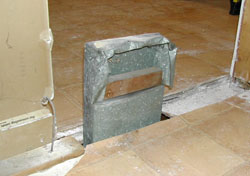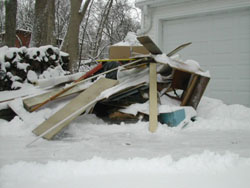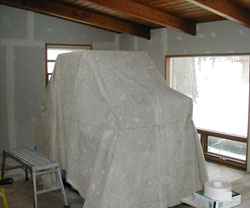
 by Steven D. Johnson
by Steven D. Johnson
Racine, Wisconsin
This month:
•
Four Mistakes I Made
•
Wood Is A Pleasant Thing
•
Cleaving to Homonyms
•
Fifty-Seven Hundred Pounds of Equipment – One Big Box
•
Building the NEW Down To Earth Workshop, Part 1 - Wiring
The Mistakes I Made in the "Unhandy" House
It is probably a bit early to do a full post-mortem on the work done in the "unhandy house"
remodeling project, since there are still a lot of unfinished items. Still, mistakes are truly
instructive, and lest I forget one of my many "teachable moments" I thought it wise to share
now.
Plan for Unforeseen Situations...

|
Figure 1 - Who would have known? This clumsily
sealed and hidden air duct took a day to resolve.
|
Every step of the project was planned in what was, I thought, infinite (almost obsessive) detail.
Sheet after sheet in my notebook detailed entries like "Day 37, 38, 39 – sand and prep floors." My
mistake was to not fully anticipate and plan for unforeseen problems. The floors took 4 days to
sand, not three. The time budget was blown. The dollar budget was also blown with added sanding
machine rental costs and additional sanding pads. There truly is no way to make up a day when you
are on a tight schedule and working mostly by yourself.
Re-routing a hidden air duct embedded in a wall cost me an extra day. Electrical problems cost
me three or four days of lost productivity. In the midst of it all, the sump pump began spewing
water on the walls from a dry-rotted rubber coupler, and a rush trip to the hardware store and the
ensuing repair and cleanup cost me another half a day. No matter how skillful one might be at
estimating the time required to do each project, it is wise to add some "buffer" or contingency time
to every project.
Penny Wise and Pound Foolish...
It was, I thought, fortunate to have a recycling center only fifteen miles away where I could
dispose of a brimming pickup truck load of material for just $7. In retrospect, 30 miles round trip
in my truck with current gas prices equals roughly $10 in gasoline cost. That translates to $17 per
load, and so far, I have disposed of 13 loads, or $221 in real cost. Almost every trip to the dump
entailed a swing through the donut shop drive-in window for coffee and sugary baked treats, so add
another five bucks or more per load. In reality, my misplaced frugality cost me close to $300.

|
Figure 2 - Piles of trash get handled multiple
times. Get a big open top
dumpster and
handle the waste only once.
|
Each trip took roughly two hours, with loading, driving, unloading, and driving back. Those 26
hours of time would have been much better spent working. There is a safety consideration as well.
Demolition is dangerous work, and the potential for injury is multiplied by handling the waste
material multiple times. I carried materials to the driveway and stacked the garbage until it
looked like a full truckload. Then I loaded the mess into the truck, one additional handling.
Then, at the dump, I unloaded everything, marking the third handling of material that was filthy,
full of rusty nails, and possibly other noxious "stuff." With an open top waste container in the
driveway, I would have handled the waste material only once.
Checking locally, renting a 30 cubic yard capacity roll-off open-top dumpster costs about $550.
Considering the time saved, the safety, and the convenience, if I ever take on another project like
this, I will order a large dumpster.
Rip It All Out First...
Most of the base trim in the house had to be removed for floor work, but it was an older profile,
not readily available, and it looked like it was going to take a lot of time to replace. The trim
was covered in multiple coats of paint. I removed a lot of the trim, but decided to try to "save"
some and some I left "in situ," thinking that it would be easier to paint in place rather than cut,
fit, and attach new baseboard. All of that thinking was a giant mistake.
As the project continued, I found myself removing more and more of the base, until all that was
left was a small section in the hallway. That small section proved difficult and time-consuming to
paint, and there was no really "seamless" way to transition from the old profile to the new. I
would have been better off to just remove it all in the beginning and be done with it.
In fact, my original decision to haul things to the dump, rather than order a dumpster, made the
process of ripping things out gradually seem logical. In real life, it caused me undue and extended heartburn
later as problem after problem was revealed. The gradual exposure of problems wasted time since many
extra trips to the supply stores were required to buy unexpected needed supplies. On a major
remodeling job like this, bite the bullet and rip everything out at once. Most problems will be
revealed early, and it will be easier to make more complete "to do" and "to buy" lists.
No Matter How Good The Sale Is...

|
Figure 3 - How do you work around this?
A way-too-early delivery of appliances
created problems throughout the project.
|
From the first visit to the "unhandy" house, I could visualize a gleaming new stainless
refrigerator and dishwasher to accompany the fairly awesome and relatively new stainless oversize
stove the former owner had installed. As luck would have it, the perfect fridge and dishwasher went
on sale a week after taking the keys to the house. Buying these items early was a big mistake.
Unable to install either, they were in the way.
As soon as the items were delivered, I inspected them for physical damage and, finding none,
repackaged them as best I could, covered them in moving blankets and a drop cloth, and set them to
the side. As the project moved along, more tools took up temporary residence in the house, and
things began to get crowded. The appliances were moved at least four times for different projects,
and slowed down the work as we took care not to damage them.
As fate would have it, when the time finally came to install the appliances, the refrigerator did
not work. The equivalent of an entire day was wasted arguing with the dealer, the manufacturer, and
the delivery service until the unit was eventually replaced. Had I waited to purchase, the
refrigerator would have been delivered, hooked up, and its defect would have been noted immediately
and the unit would have been replaced quickly. Had I waited, these bulky appliances would have been
out of the way and in no danger of damage. There would have been more "elbow" room, and the work
could have progressed more quickly. A few dollars of savings proved to be a point of frustration
and wasted time.
Simple Steps to Avoid Remodeling Frustration
- Everything is going to take longer than you think – plan for it, then add a few extra
days
- While the words frugal and cheap may technically mean almost the same thing, they do not –
don't be "penny wise and pound foolish"
- Do demolition all at once – you may discover all kinds of new challenges all at once, but
you will be better able to plan and execute and you will save time!
- Even if you catch a good sale, think long and hard about buying things before they are
needed. Where will you store them? Will they be in the way? Could they be damaged during the
renovation?
(Page 1 of 4)
1
2
3
4
Next Page
Return to Wood News front page
